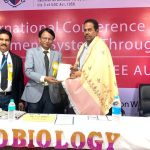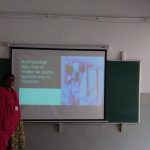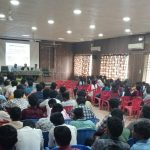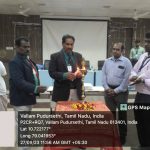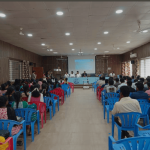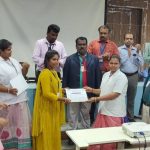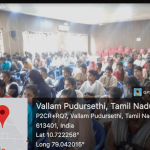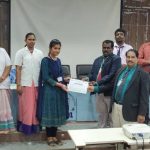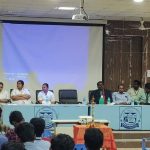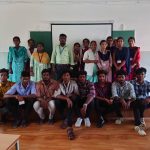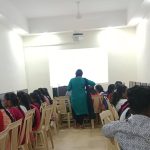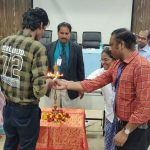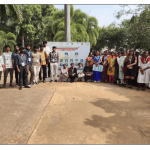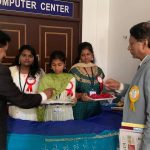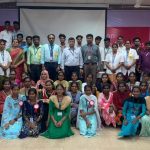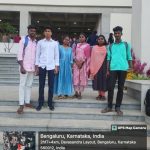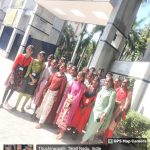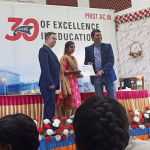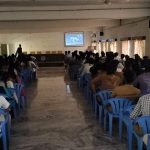The strength of the Department of Microbiology lies in the potential and dedication of the faculty team in addition to the well-equipped laboratories. The faculty and students get to work with facilities like advanced Nikon Photo Microscopy, Two-Dimensional Gel Electrophoresis, ELISA Reader, Thermal Cycler and Gel Document system. The department encourages industry tie-ups for pursuing project works.
Vision:
- To empower students with the knowledge, skill, and attitude needed to excel as professionals and entrepreneurs with high ethical standards.
- With accelerated research registering accomplishments in frontiers in microbiology
Mission:
- To pursue and promote superior quality education in microbiology
- To attempt original research and develop hypothesis in microbiology
- To ensure quality and morality in education
- To provide a platform for innovation and creative environment for the faculty and students
- To develop individuals with diverse interests and expertise
To prepare students to cater to the trending industry needs.
B.Sc. Microbiology (3 years Programme)
Programme Outcomes – POs
- Vital Thinking: Able to acquire knowledgeable actions and give the impression of being at our thoughts and assessments (academic, organizational and individual) from diverse perception.
- Precious communication: Able to speak, read, write and listen noticeably in person and throughout electronic media in English and in one Indian language and build meaning of the globe by connecting people, thoughts books, media and technology.
- Effectual citizenship: Able to reveal empathetic social concern and fairness centred national progress and the capability to act with and take part in civic life through volunteering
- Ethics: Be aware of diverse value systems including the individual, under the ethical dimensions of personal choice, and believe responsibility for them.
- Environment and Sustainability: Able to analyze the importance of microbes for environmental clean-up and sustainable development.
- Self directed and life-long learning: Able to gain the talent to employ in self-determining and life-long learning in the broadest circumstance socio technological transforms.
- Economic liberty and employability potential: Attain the ability to be successful in an economically sustainable ecosystem.
M.Sc. Microbiology (2 years Programme)
Programme Outcomes – POs
- Be aware of diverse value systems including the individual, under the ethical dimensions of personal choice, and believe responsibility for them.
- Environment and Sustainability: Analyze the importance of microbes for environmental clean-up and sustainable development.
- Self directed and life-long learning: To gain the talent to employ in self-determining and life-long learning in the broadest circumstance socio technological transforms.
- Recognizing the link between science and society through a meaningful discussion of scientific and ethical issues in microbiology
PhD Programme
The Ph.D. programme includes an integrated sequence of course work and research in various branches of Microbiology. Scholars are selected through the entrance examination conducted by PRIST.
Add-on, Certificate and Diploma courses
Add-on course – Spirullina cultivation, Mushroom Cultivation
Certificate Course – Mushroom Cultivation, Agricultural technology
Diploma Course – Agricultural technology
More information on the procedure for admission to all the above programmes may be found at www.prist.ac.in
S. No | NAME | DESIGNATION | QUALIFICATION |
Dr. T. Ushadevi | Professor | M.Sc., M.Phil., Ph.D. | |
Dr. R.Sathya | Assoc. Prof | M.Sc, Ph.D. | |
Dr. N.Mahalakshmi | Assoc. Prof | M.Sc, M.Phil., Ph.D. | |
Dr.T.Thiruselvi | Asst. Prof | M.Sc., Ph.D. | |
Dr.A.XavierFernandes | Asst. Prof | M.Sc.M.Ed,M.phil, Ph.D. | |
Dr.G. Chandirasegaran | Asst. Prof | M.Sc., M.Phil., Ph.D. | |
Dr.K.P.Karuppaian | Asst. Prof | M.Sc, Ph.D. | |
Dr.K.Ambika | Asst. Prof | M.Sc., M.Phil., Ph.D. | |
Dr.S.Mahadevan | Asst. Prof | M.Sc., M.Ed., M.phil., Ph.D. | |
Dr.Manimekalai | Asst. Prof | M.Sc., M.Ed., M.phil., Ph.D. |
Core Scientific Knowledge
- Comprehensive Understanding of Microbiology: Graduates should possess a deep knowledge of microbial sciences, including the ability to classify microorganisms and monitor their responses to different stimuli.
- Research Methodology: A solid grasp of research principles and methodologies is crucial, enabling graduates to design and conduct experiments effectively.
Technical and Laboratory Skills
- Laboratory Techniques: Proficiency in essential microbiological techniques such as Gram staining, ELISA, preparation of bacterial smears, aseptic techniques, and handling microorganisms is fundamental.
- Biosafety Practices: Understanding and implementing biosafety protocols to ensure safe laboratory practices.
Analytical and Problem-Solving Abilities
- Critical Thinking: Ability to analyze data, interpret results, and draw logical conclusions from experiments.
- Problem-Solving: Developing solutions to scientific problems through experimentation and analysis.
Communication and Interpersonal Skills
- Effective Communication: Capability to convey research findings clearly, both orally and in writing, to scientific and non-scientific audiences.
- Teamwork: Collaborating with peers and professionals in multidisciplinary teams to achieve common research goals.
Personal and Professional Development
- Adaptability: Willingness to learn from errors, accept feedback, and adapt to new challenges in the field.
- Ethical Conduct: Understanding and applying ethical principles in research and professional activities.
- Continuous Learning: Commitment to ongoing professional development and staying updated with advancements in microbiology.
The thrust areas of research of the department are Clinical microbiology, Agricultural microbiology, Environmental microbiology, Industrial Microbiology, and Microbiome. The faculties of the department have published research articles in high impact journals of leading scientific publishers such as Elsevier, Wiley Interscience, Springer, American Microbiology Society (ACS) and Royal Society of Microbiology (RSM), etc.
SOME RECENT PUBLICATIONS :
(JOURNALS / BOOK / BOOK CHAPTERS)
- B Nilavu, A Das, R Sathya, N Mahalakshmi. Rice-Mill Wastewater Treatment Using Microbial Electrolytic Cell (Mec): Quality Characterization and Performance Assessment.Rasayan Journal of Chemistry, Volume 17: No. 2 : 525-530: 2024. https://rasayanjournal.co.in/admin/php/upload/4226_pdf.pdf
- N Mahalakshmi, S Menon, P Senbagalakshmi, T Thiruselvi,A Xavier Fernandes. Biodiesel Production from Fish Waste of Ctenopharyngodon idella (Grass fish), Oreochromis niloticus (Tilapia) and Sardina pilchardus (Sardine). Kristu Jayanti Journal of Core and Applied Biology Volume3:Issue2;2023.https://www.kristujayantijournal.com/index.php/ijls/article/view/2384/1799
- Rengasamy Sathya,Mariadhas Valan Arasu, Naif Abdullah Al-Dhabi, Ponnuswamy Vijayaraghavan, Soundharrajan Ilavenil, TS Rejiniemon, ‘Towards sustainable wastewater treatment by biological methods’ – Challenges and advantages of recent technologies, Urban Climate, Volume 47, 2023, 101378 https://doi.org/10.1016/j.uclim.2022.101378 (Impact factor: 6.66) Elsevier.
- Rengasamy Sathya, Mariadhas Valan Arasu, Soundharrajan Ilavenil, TS Rejiniemon, Ponnuswamy Vijayaraghavan, ‘Cosmeceutical potentials of litchi fruit and its by-products for a sustainable revalorization’, Biocatalysis and Agricultural Biotechnology, Volume 50, July 2023, 102683 https://doi.org/10.1016/j.bcab.2023.102683(Impact factor: 4.25) Elsevier.
- Thanh Luan Nguyen, Thi Huong Pham, Nguyen Minh Viet, Phan Quang Thang, Rajakrishnan Rajagopal, Rengasamy Sathya,Sung Hoon Jung, Taeyoung Kim, ‘Improved photodegradation of antibiotics pollutants in wastewaters by advanced oxidation process based on Ni-doped TiO2’, Chemosphere, Volume 302, 2022, 1348379 (Impact factor:8.943). https://doi.org/10.1016/j.chemosphere.2022.134837,
- P Samiyammal, A Kokila, L Arul Pragasan, Rajagopal Rajakrishnan, Rengasamy Sathya, S Ragupathy, M Krishnakumar, Vasudeva Reddy Minnam Reddy, ‘Adsorption of brilliant green dye onto activated carbon prepared from cashew nut shell by KOH activation: Studies on equilibrium isotherm’, Environmental Research, 2022, 113497 (Impact factor: 8.431).https://doi.org/10.1016/j.envres.2022.113497
- K Sathishkumar, K Sowmiya, L Arul Pragasan, Rajagopal Rajakrishnan, Rengasamy Sathya, S Ragupathy, M Krishnakumar, Vasudeva Reddy Minnam Reddy, ‘Enhanced photocatalytic degradation of organic pollutants by Ag-TiO2loaded cassava stem activated carbon under sunlight irradiation’, Chemosphere, Volume 302, 2022, 134844 (Impact factor 8.943).https://doi.org/10.1016/j.chemosphere.2022.134844
- H Joy Prabu, Rintu Varghese, I Johnson, S John Sundaram, A Dhayal Raj, Rajakrishnan Rajagopal, Palaniselvam Kuppusamy, Rengasamy Sathya, K Kaviyarasu,Laser induced plant leaf extract mediated synthesis of CuO nanoparticles and its photocatalytic activity, Environmental Research, 2022, 113295 (Impact factor: 8.431). https://doi.org/10.1016/j.envres.2022.113295
- Awaher Alkahtani, Mohamed S Elshikh, Yheni Dwiningsih, Muthaiyan Ahalliya Rathi, Rengasamy Sathya,P Vijayaraghavan, ‘In-vitroantidepressant property of methanol extract of Bacopa monnieri’, Journal of King Saud University – Science, Volume 34, Issue 8, November 2022, 102299 https://doi.org/10.1016/j.jksus.2022.102299. (Impact factor: 4.011), Elsevier
- R Rajagopal, P Kuppusamy, Rengasamy Sathya, P Nandhakumari Asha D V Bensy G.D. Biji, ‘Antifungal phytochemicals from the methanol and aqueous extract of Acacia concinna and Lantana camara and synergistic biological control of the Hibiscus mealybug (Maconellicoccus hirsutus)’, Physiological and Molecular Plant Pathology 119 (2022)101813. (Impact factor: 2.747)https://doi.org/10.1016/j.pmpp.2022.101813, Elsevier.
- Kothandapani SundarMahima M,Kumara Guru K,P. Vasanthakumari,G. Jayalakshmi, ‘Quorum Sensing Based Drug Screening Against Vibrio Cholerae’, (2022) Journal of Microbes and Research, https://doi.org/10.0810/JMR.2022/0001.
- Ramachandira Prabu, Amaresh Mohanty, Susmida Seni Balakrishnan, G Jayalakshmi, Kothandapani Sundar, Molecular docking and simulation of IcaC protein as O-succinyltransferase function in staphylococcus epidermidis biofilm formation, Current Research in Structural Biology, 2022, 7: 78-86.
- Kanimozhi, R. Durga, M. Sabithasree, A. Vimal Kumar, A. Sofiavizhimalar, Avinash Ashok Kadam c, R Rajagopal, Rengasamy Sathya,Nur Izyan Wan Azelee, Biogenic synthesis of silver nanoparticle using Cissus quadrangularis extract and its invitro study, Journal of King Saud University – Science 34 (2022) 101930. (Impact factor:4.011), https://doi.org/10.1016/j.jksus.2022.101930 Elsevier.
- Sathish Kumar Karuppannan, Jayandra Bushion, Raghavendra Ramalingam,
Subhashini Swaminathan, Kantha Deivi Arunachalam, Avinash Ashok Kadam, R Rajagopal, Rengasamy Sathya, Sasikala Chinnappan, ‘Fabrication, characterization and in vitro evaluation of Melia dubia extract infused nanofibers for wound dressing’, Journal of King Saud University – Science 34 (2022) 101931. https://doi.org/10.1016/j.jksus.2022.101931Impact factor – 4.011. - Sherin John Joseph, Shanmugapriya Shanmuga sundaram, Mohammed Junaid Hussain Dowlath, Kantha Deivi Arunachalam, P. Balakrishna Murthy, Avinash Ashok Kadam, R. Rajakrishnan, Rengasamy Sathya, Sasikala Chinnappan, ‘Protective effect of Gymnema sylvestre leaf extract against uranium toxicity in human peripheral blood mononuclear cells’, Journal of King Saud University – Science 34 (2022) 101895. Impact factor – 4.011.
- I Soundharrajan, HS Park, Sathya Rengasamy (Equal Contribution),R Sivanesan, KC Choi (2021) ‘Application and Future Prospective of Lactic Acid Bacteria as Natural Additives for Silage Production—A Review’, Applied Sciences 11 (17), 8127. https://doi.org/10.1016/j.jksus. 2022.101895 (Impact factor- 3.671).
- Mathan Periasamy , M.Elanchezhian and Surulimuthu Muthiah, Bacteriospermia – ‘An Important Factor Which Needs More Attention in Infertility Care’, Biosciences Biotechnology Research Asia 2020, Vol. 17(2), p. 285-291.
- Mathan Periasamy,M Elanchezhian, Yaramareddy Swapna, ‘Bacillus Calmette Guérin vaccination – An old weapon for a new enemy COVID 19’, Current Medicine Research and Project, 2020, 10(5)245-250.
- Sundar Kumarakuru, P. Vasanthakumari, V. Meyappan, ‘Impact of Thermal Process on Quality Characteristics of Instant Squid Mix’, American Journal of Food Technology, 2020, 15: 35-42.
- Sathya Rengasamy,Mohan Raj Subramanian , Varalakshmi Perumal , Shakambari Ganeshan , Manal M. Al Khulaifi , Hind A. AL-Shwaiman , Abdallah M. Elgorban, Asad Syed, Ushadevi Thangaprakasam, Purification and kinetic behavior of glucose isomerase from Streptomyces lividans RSU26. Saudi Journal of Biological Sciences. 27 (2020) 1117–1123, https://doi.org/10.1016/j.sjbs.2019.12.024 (Impact factor- 4.25). Elsevier
Books / Book Chapters
- Kothandapani Sundar, Ramachandira Prabu, Gopal Jayalakshmi, ‘Quorum Sensing Inhibition Based Drugs to Conquer Antimicrobial Resistance’, The Global Antimicrobial Resistance Epidemic: Innovative Approaches and Cutting-Edge Solutions, BoD–Books on Demand, 2022/9/14.
- Kothandapani Sundar, T Ramachandira Prabu, ‘Microbial metabolites in nutrition and healthcare’, Volatiles and Metabolites of Microbes, Academic Press, 2021: 239-256
- Rengasamy Sathya, T. Ushadevi, ‘Microbial Biofilm in Clinical Bioremediation Practices in Human Health’, CRC press, Taylor & Francis group, USA, 1 st Edition, 2020.
- T.Ramachandira Prabu, K. Sundar, ‘Volatiles and Metabolites of Microbes: Application in Sustainable Agriculture and health care’, Microbial metabolites in nutrition and healthcare, Elsevier, 2020
PATENT
Aj Lakade Ph Shetty, K Sundar, 2022 Methods to Detect Acidic Food Spoilage, Patent Number 407123, Application Number 4425/Che/2014
SEED MONEY
Faculty | Academic year | Amount sanctioned, Amount in Rs. |
Title of the project |
Dr. R. Sathya |
2021-2022 |
5,00,000 | Biodegradation of Naphthalene by Biocatalyst Isolated from the Contaminated Environment under Optimal Conditions |
Dr. K. Sundar |
2021-2022 |
6,00,000 | Accessibility And Management Strategies for Municipal Solid Waste in Union Territory of Pondicherry |
| Dr. A. Xavier Fernandes | 2021-2022 | 8,20,000 | In Vitro Anticancer Activity of Marine Fungus |
- 2020-2021 Dr. R. Sathya, Best paper presentation Award (First Prize) received in National Conference Biodiversity Authority of India.
- 2020- 2021 Dr. R. Sathya, got National Level Topper in Industrial Biotechnology Swayam NPTEL Course.
- 2020- 2021 Dr. R. Sathya, Received NPTEL Silver medal.
- 2019-2020 Dr. R. Sathya, Received NPEL Elite Certification Awards.
- 2018-2019 Dr. K. Sundar Received the Newton-Bhabha Fund RSC Researcher Links Workshop Best Researcher Award” from PRIST Deemed to be University.
- 2017-2018 Dr. K. Sundar received the ” Young Scientist from DST-SERB .
- 2017-2018 Dr. K. Sundar received the ” InSc Research Excellence award ” from PRIST Deemed to be University.
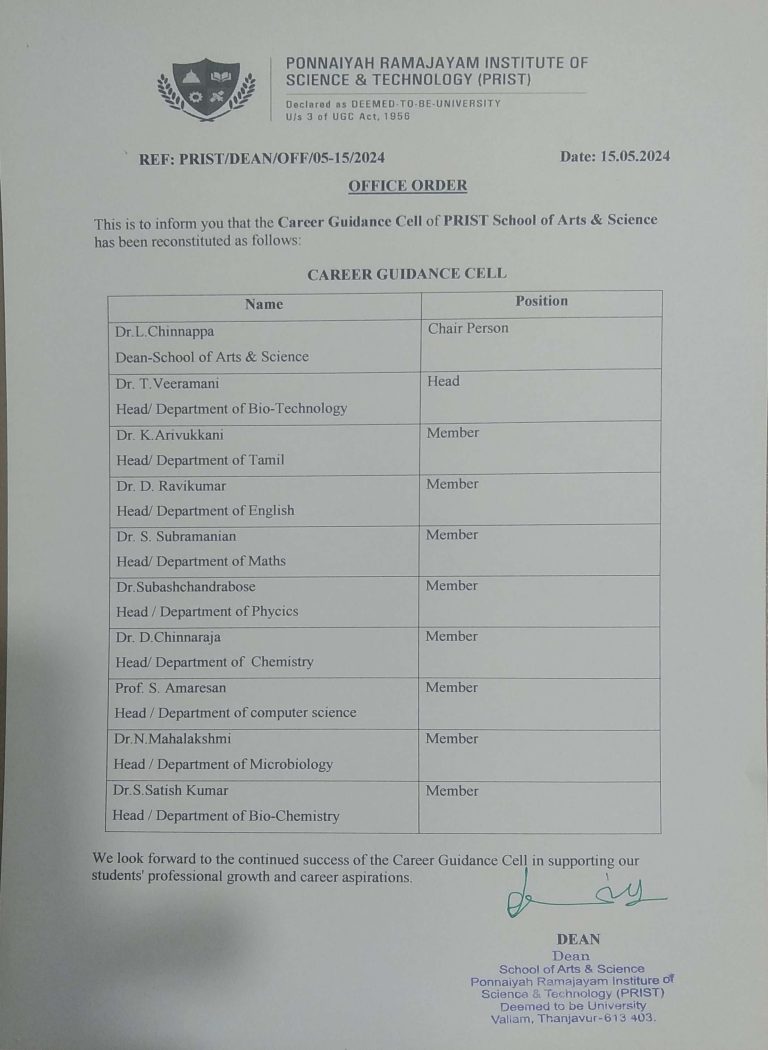
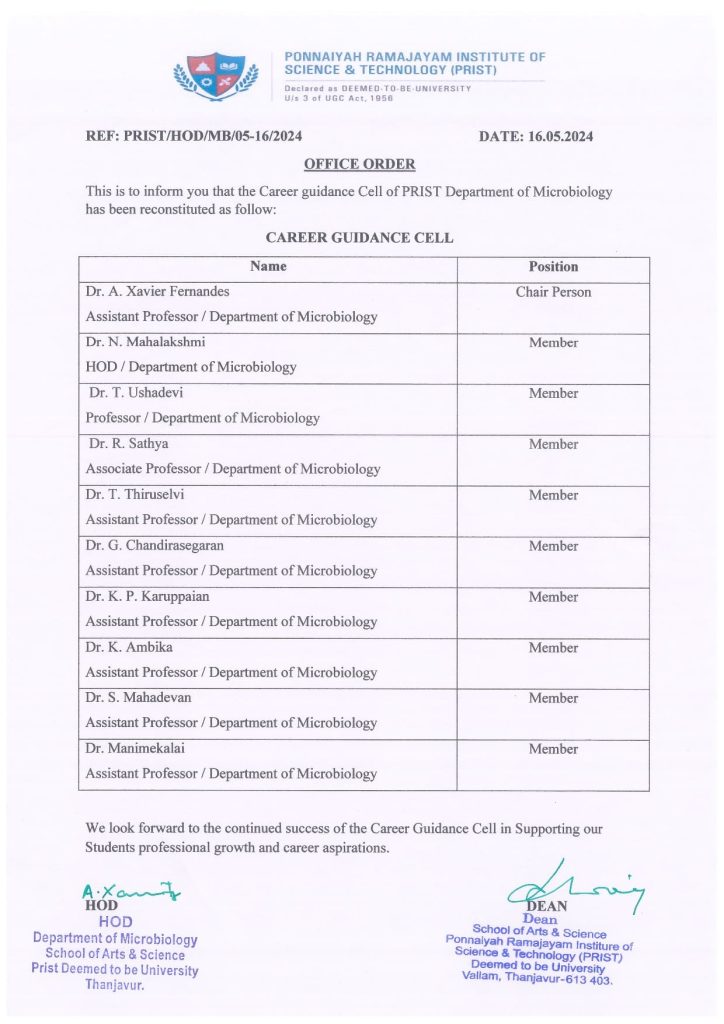
- Career Counselling programme on “Scientific Writer” – 24th September 2024.
- Club Activities programme on “Quiz” – 20th September 2024.
- Soft Skills programme on “Trends in Data Science” – 9th September 2024
- Life Skills programme on “Training in Value Added Product from SCP” – 3rd September 2024.
- Competitive Examination Guidance programme on “ARS Exam Preparation” – 20th August 2024.
- Language & Communication Skills programme on “In-house Seminar: Biological Data Science” – 9th August 2024.
- Cultural Fest programme on “Cultural Fest’23” – 26th April 2024.
- Technical Fest programme on “Technical Fest’23” – 17th April 2024.
- Soft Skills programme on “Workshop – Azolla Cultivation” – 2nd March 2024.
- Life Skills programme on “Future Ready: Skills for Life & Beyond” – 7th February 2024.
- Competitive Examination Guidance programme on “Prepare Students for the Staff Selection Commission Exams” – 7th February 2024.
- Awareness of Trends and Technology programme on “DNA Sequence Analysis for Fungi” – 9th October 2023.
- Career Counselling programme on “Scientific Paper Writing” – 5th October 2023.
- Language & Communication Skills programme on “In-house Seminar: Career Guidance & Opportunity Abroad” – 27th September 2023.
- Club Activities programme on “International Microorganism Day” – 17th September 2023.
- Language & Communication Skills programme on “Guest Lecture – Exploring Impact of Gut Microbes on Human Health” – 27th August 2023.
- Life Skills programme on “Foundation for Success: Essential Life Skills for All Ages” – 7th August 2023.
- Competitive Examination Guidance programme on “Mastering NET & SET Comprehensive Coaching for Success” – 2nd August 2023.
- Career Counselling programme on “Life Science Career Specialist” – 3rd April 2023
Head, Department of Microbiology, School of Arts and Science,
PONNAIYAH RAMAJAYAM INSTITUTE OF SCIENCE & TECHNOLOGY(PRIST), Vallam, Thanjavur -613403.
Email:
hodmicrobiology@prist.ac.in
Phone:
9787816115

